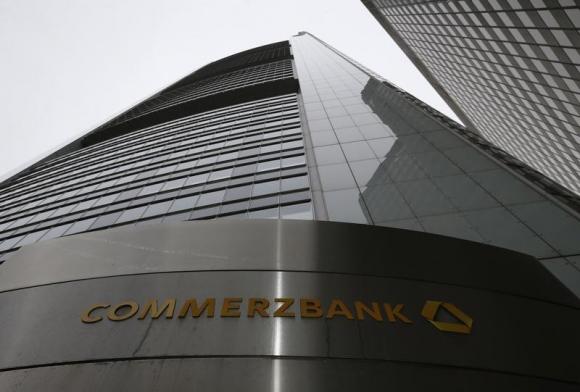 The headquarters of the Commerzbank AG is pictured before the bank's annual news conference in Frankfurt February 13, 2014.[/caption]
The headquarters of the Commerzbank AG is pictured before the bank's annual news conference in Frankfurt February 13, 2014.[/caption](Reuters) - New York's financial regulator wants some Commerzbank AG employees to be fired as part of a settlement over allegations the German lender improperly processed transactions with�Iran�and other countries facing U.S. sanctions, according to people familiar with the matter.
Commerzbank is nearing an agreement to pay some $650 million to U.S. authorities over sanctions-related violations, with almost half going to the regulator, New York�s Department of Financial Services, Reuters has reported.
The bank, which is 17 percent owned by the German government, would join more than a half dozen foreign�banksthat have already settled with U.S. authorities for similar wrongdoing.
In Commerzbank�s case, the department directed the bank to take steps to terminate a handful of employees who engaged in misconduct, one source said. The source did not reveal the names of executives who may face punishment.
It is also unclear whether the employees will be dismissed or be disciplined in other ways, sources said, in part due to Germany's strong labor laws and how long ago the alleged misdeeds took place.
Matthew Anderson, a spokesman for the New York regulator, did not return calls for comment. Margarita Thiel, a spokeswoman for Commerzbank, declined comment.
For months, Benjamin Lawsky, superintendent of the department, has said it is necessary to do more than penalize institutions for wrongdoing.
"If you're not holding individuals accountable, you're not going to get the full effects of deterrence," the regulator reiterated at an event in lower Manhattan last week.
In addition to pressing for employees involved in misconduct to lose their jobs, Lawsky said he might seek other sanctions, such as clawing back bonuses. As a regulator, he does not have the power to bring criminal charges.
The office told another bank to terminate employees earlier this year. As part of the $8.9 billion agreement struck in June between U.S. authorities and BNP Paribas over sanctions violations, 13 people were fired or separated from the French bank at the regulator's behest, and another 32 were otherwise disciplined through demotions, compensation and other sanctions, according to the agency.
Paribas also pleaded guilty to conspiring to violate U.S. sanctions and other charges brought by the Manhattan District Attorney and U.S. prosecutors.
In its deal, Commerzbank is expected to enter into deferred prosecution agreements with state and federal prosecutors, which would suspend criminal charges, Reuters has reported.
Besides the New York regulator, authorities involved include the U.S. Department of Justice, the U.S. Attorney in Washington, D.C., the Manhattan District Attorney, the Federal Reserve and the Treasury Department.
They all declined to comment on negotiations when contacted by Reuters.
Authorities had been hoping to wrap up the deal by the end of the month, sources said, but that timetable may no longer hold. One recent sticking point has been the New York regulator's demand that an independent monitor be installed at Commerzbank to oversee its work.
Such monitors have become a staple of the agency's settlements, but may carry additional risk for�banks. Standard Chartered Bank, which settled a similar sanctions probe with U.S. prosecutors and regulators two years ago for $667 million, paid another $300 million to New York in August and agreed to suspend some businesses after failing to fix problems required under the 2012 deal.
Another possible complication is that Manhattan U.S. Attorney Preet Bharara has begun probing lax anti-money laundering controls at Commerzbank, according to one source.
Betsy Feuerstein, a spokeswoman for the Manhattan U.S. Attorney, declined comment.
In 2012, the Federal Reserve Bank of New York entered into an agreement with Commerzbank that required its New York branch to improve compliance with anti-money laundering laws and regulations. After finding the branch still failed to maintain adequate controls, the Fed Reserve issued a cease and desist order last year.
By Reuters
The Iran Project is not responsible for the content of quoted articles.










